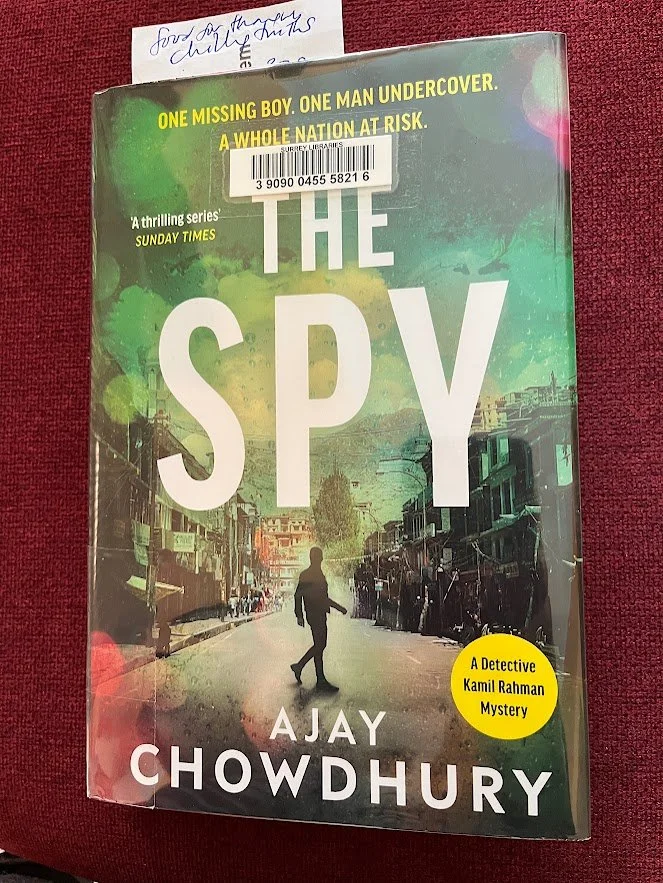The Spy by Ajay Chowdhury
For the second time since I heard Elif Shafak’s recent Guardian talk about the redemptive social possibilities of fiction, I’ve been reminded how novelists of our era are growing beyond portrayals of the past to reflect the present. Dedicated to “the journalists who walk unafraid,” Chowdhury’s tale shows equal mastery of cracking good story and sober reflection.
Protagonist Kamil Rahman, former Kolkata policeman, began his London life as a waiter, then worked as a cook. In this volume, he is seconded from his job as a detective for the London police to assist MI5. Thanks to his brown skin and Muslim heritage, Five asks him to infiltrate a mosque where they suspect a major act of terror is being fomented.
For me this novel was like entering a familiar contemporary London—Brick Lane in particular—peopled by my old friends from Chowdhury’s previous books. The Spy also touches on the cynical use of Hindu nationalism in India, and features chilling scenes of political violence in Kashmir.
Though there is a harsh realism behind this contemporary tale, Chowdhury tells it with his trademark compassion and humour.
When Anjoli learns that fourteen-year-old Rahul has been kidnapped, she vows to find him. Tracing his homeward journey from a friend’s house on Google Maps, she notices a shortcut through a park, and wonders whether he took it. “It would have been dark at nine-thirty…but you never knew with teenagers. Unmatured prefrontal cortex equalled risk taking and poor decision making—she remembered that from her psychology degree.”
Dining with his ex from India, a lawyer who works for Amnesty, Kamil summarizes the situation that underlies his MI5 assignment. While the Indian government tries “to create a Hindu theocracy, Muslims are being killed, Kashmiris have been disenfranchised…” and “the Bollywood film industry is totally captured and making pro-Hindu films.” He’s glad he’s no longer living in India. On the whole, “it seems to be live and let live over here.” There is undoubted racism in the UK, but he’s unsure “how much of that is being Muslim versus being brown.”
In the following passage concerning Anjoli’s restaurant, Tandoori Knights, the author manages to joke and be serious all at once. Under cover for his assignment, Kamal returns to his job there, wondering how his new look will affect his friend’s thriving business. “The beard I’m growing fits in well with Anjoli’s trendy hipster ethos. As long as I don’t show up in a thobe, I should be fine. Although who knows, it might create a new trend with our diners raving about the authenticity of the waiters, and Anjoli winning praise for givng employment to not just the unhoused, but the unhinged as well.”
Of course, Kamal’s MI5 assignment entails working under a handler. When he asks about the fate of one of their catches, “Emily” says, ‘He’s ours now. We’ll deal with him.’
For Kamal, there’s “something chilling in her words.” Realizing he doesn’t know her at all, he feels that “Every interaction with her has taken place with a gauzy curtain between us.” Seeing her “only indistinctly,” he is strongly aware that a handler does not serve as a friend, therapist or confessor.
For the convinced/deluded terrorist, everything is black and white. When he asks Kamal “What are you,” the other man’s answer is too complex to satisfy him, and he grills him further. “But what comes first? Being a Muslim or being Indian?” Told that it depends on the context, the man laughs, completely unable to understand the nuances of the other’s sense of identity.
He then launches into a rant, claiming “The time of the West has gone…corrupt and decaying…It’s time for India to rise. Hindus already run the top technology companies in the West—Google, Microsoft—IBM. We control what billions of people around the world see and think… India is resurgent…We have been kept under the heel of the Mughals and the British for too long…”
When Kamal mildly points out that the British left over seventy-five years ago…and the Mughals long before that,” his interlocutor ignores him, spouting on about making India great again, purifying “our race.” Echoes of the raving of Donald Trump and so many others through history.
This novel certainly delivers food for thought—with flavours as complex as those created by the new chef in Anjoli’s restaurant.

